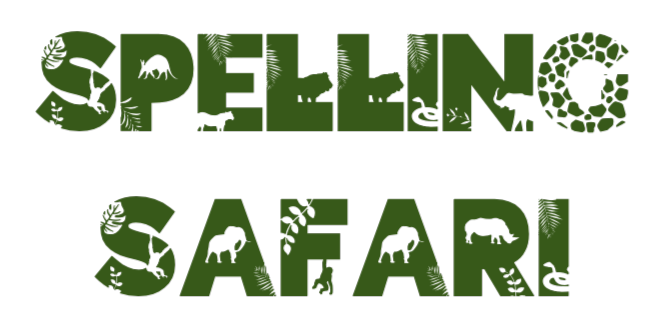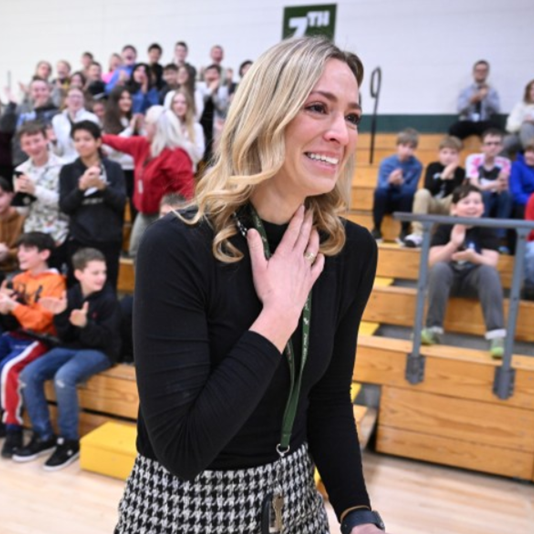New spelling app promises more student learning, less educator work
Ed-tech entrepreneur is veteran Utica elementary teacher
This year MEA member Jonathan Marceau is watching the dream he shepherded to reality take on a life of its own out in the world.
A veteran elementary teacher in Utica Community Schools, Marceau launched his award-winning app—Spelling Safari—in mid-August from an idea that has stayed with him ever since his student teaching 20 years ago.
Described as a “curriculum reinvention and software solution providing elementary students with fun and adaptive learning,” Spelling Safari won the second annual Michigan EdTech Innovation Contest in 2023, which MEA helps to sponsor.
The traditional method of teaching spelling by giving every child in a class the same spelling list every week doesn’t work to fully develop students’ skills and confidence, Marceau said. “It has a lot of missed learning opportunities.”
Above-level learners get bored. Below-level learners get frustrated. And words that are missed by some students on culminating tests simply disappear the next week as a new spelling list is presented.
“If the words on a generic list are out of students’ reach, they’re not picking up much because they’re not going to come across those words in their leveled reading and writing either,” Marceau said.
He first became interested in personalized learning in 2004, while student teaching in Ann Arbor, when his supervising teacher gave more advanced spellers different lists from others in class, and they quizzed each other to develop their own unique spelling lists by skipping words they already knew.
The next fall, in his first year teaching in Utica, Marceau pulled together multiple word lists and devised a paper-pencil system for students to quiz each other and build personalized spelling lists from words they missed—a system he refined over a decade to positive effect, he said.
“I regularly saw that students were advancing more than a grade level even with all the flaws of a paper-pencil system—the kids quizzing each other, mispronouncing words, that sort of thing. I always wanted to turn it into a computerized system and make it even better, but I hesitated to go all-in.
“I dabbled with it here and there, but coming out of the pandemic in the fall of 2021 I said to myself, ‘I can’t go my whole life without taking this leap.’”
The result is an app designed primarily for desktop computers, laptops and tablets, which starts with a diagnostic assessment to identify students’ level. Then learners cycle through an adaptive process of pretest-practice-test, and any missed words from the test reappear in the following cycle’s list.
Dozens of practice activities are built into the program, and children see and hear their spelling words being pronounced correctly and used in sentences written at their level. The safari theme engages kids by gamifying the experience: as they achieve, students advance to the next “animal camp.”
Youngsters like to track their own growth via progress displays, because human beings enjoy taking on meaningful challenges that stretch them to learn within their zone of proximal development, which is the beauty of adaptive, personalized learning, Marceau said.
“The whole system gives students instantaneous feedback. When they miss a word in the pretest, which we call the quiz, it tells them right away and shows them the correct spelling side by side with their spelling. In the practice activities, it gives them feedback. The test at the end is graded instantly.
“Instantaneous feedback is a best practice for learning, and that’s embedded here.”
Last school year Spelling Safari was piloted in 10 classrooms with 200-plus students. Marceau was a piloting teacher and admitted, “It was exciting to see the students enjoying it. I had a lot of feedback that they liked it more than paper-pencil versions and they liked having their own list of words.”
Even more exciting was the progress piloting students made: an average of one-fourth of a grade level every six weeks—about a 50% increase over traditional methods. The program’s adaptive word lists more than double kids’ exposure to new words and more than triple the amount of words learned.
“The benefit is pretty tremendous on the learning side, and then with our automated system we pledge to save teachers 100 hours a year in not having to prep, give assessments, grade,” Marceau said.
What Spelling Safari offers over competitors is the extensive size of included word lists, which Marceau hand-developed over years in the classroom, drawn from multiple elementary curricula. Lower elementary lists are organized by spelling patterns, so students learn those by discovery.
“I’ve spent my career trying to do my very best for children in the classroom, so this is giving me a possibility of reaching even more students beyond my classroom and building and district, and that means a lot to me,” Marceau said.
“Spelling is still a foundational piece of learning to read and write, and I think reading and writing will be more important than ever in an age of AI we have coming up. Those are large language models, and you have to be able to fluently use language in order to use those tools effectively.”
The 20-year veteran has always been active in his local union, the Utica Education Association, serving on the board in addition to crisis and bargaining committees. This year he’s taken a leave of absence from teaching to focus on getting his tech project off the ground.
“It’s thrilling and it’s terrifying,” he said of his leap of faith. “I have zero income right now; I had to figure out my health insurance; I’m living on whatever savings I have; I’ve poured a bunch of my own money and investor money from friends and family into this, so there’s a lot riding on it, right?
“One of the surprising things to me is I’ve spent 20 years in the classroom, and one of the main roles of that is helping kids manage their emotions, and now I’m having to manage my own emotions. There are incredible highs, and then there’re lows. I hear entrepreneurs talking about this all the time.”
In the short time Spelling Safari has been on the market, response has been strong between subscription sales and free trials, he said. A one-year classroom subscription costs $100, below competitors’ pricing, and Marceau has goals to expand the app by adding mini-lessons.
“All of the competitors I know of have essentially taken traditional spelling and put it online. Mine is the only one that individualizes lists for students based on their level,” he said.
Marceau won $10,000 in startup cash, plus design support and legal consultation, in winning the Michigan EdTech Innovation Contest 18 months ago, a competition operated via partnership by Michigan Virtual, Michigan State’s Burgess Institute for Entrepreneurship and Innovation, Spartan Innovations (a subsidiary of MSU Research Foundation), and Michigan Small Business Development Council.
By the time he won, Spelling Safari had already been in development with the help of Ann Arbor tech consultant and co-founder Jonn Behrman and software development company Fanzoo Technology. The biggest prize he got from his first-place selection was a boost in confidence, he said.
“It confirmed that ‘Hey, I’ve got something here.’ If a panel of judges from the business sector think this is a good idea and a good business approach, then it tells me this is something solid.”
The hardest part of launching the business four months ago was assigning any price for educators, he said. “I don’t love the idea of selling to elementary teachers because I don’t think they should have to pay for things, but I hope they will find other possibilities to pick up the tab.”
Marceau suggests approaching a principal or PTA group, making a wish list for parent donations, or asking a parent to gather donations for a subscription. “I’ve tried to keep the cost pretty reasonable and give teachers something back that money can’t buy: time saved all year long.”





